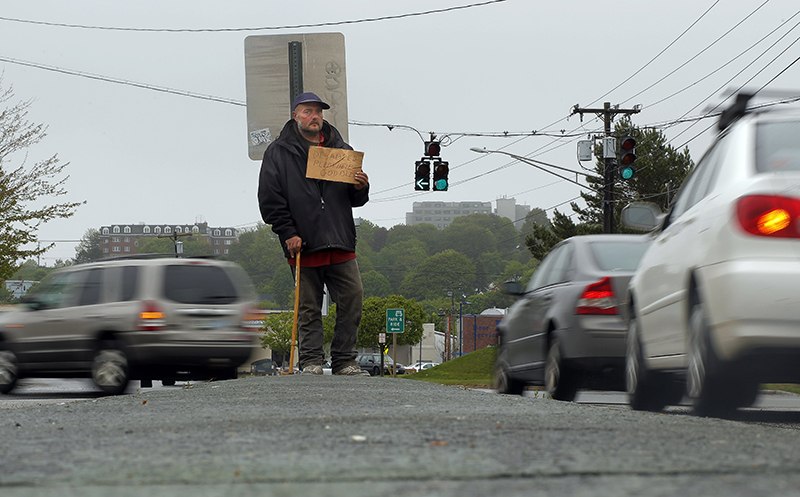PORTLAND — Panhandlers should be a less common sight on city street medians beginning Thursday when police begin enforcing a ban on begging from the middle of roadways.
City officials and social service agencies plan to use the occasion to highlight ongoing efforts to prevent and end homelessness.
Meanwhile, Portland Police Chief Michael Sauschuck said officers have been informing panhandlers about the new ordinance ever since it was passed by the council.
Now, he said, they will be able to ask panhandlers to leave a median.
It will be up to individuals officers whether to issue a civil citation, which can lead to a $100 to $500 fine, the chief said, although he is expecting more warnings than fines.
“I would describe this as a bit of a soft rollout,” Sauschuck said Wednesday. “My expectation and my direction to the officers is that we do provide warnings.”
Last month, the City Council unanimously passed the ban, saying it was needed to protect public safety — both for panhandlers and the traveling public.
Panhandlers sometimes walk into the street and almost get hit by cars, and some drivers stop abruptly to give people money.
Police compared complaints about median-strip panhandling from January through May 2012 to the same period this year.
Complaints increased about 23 percent, from 101 last year to 124 this year.
Opponents argued that it is disingenuous for city councilors, police and businesses to say they are concerned about the homeless when there’s a lack of affordable housing and jobs, and of substance abuse and mental health programs.
Meanwhile, Lewiston is considering ordinances banning aggressive panhandling and panhandling in traffic, according to The Sun Journal newspaper.
Portland and Bangor have already banned aggressive panhandling.
The American Civil Liberties Union of Maine is still considering whether it will challenge Portland’s street median panhandling ban in court, said spokesperson Rachel Healy.
In a federal appeals court on Wednesday, a Michigan law banning panhandling in public places was struck down. The American Civil Liberties Union initially filed the suit in 2011 on behalf of two men from Grand Rapids who were arrested for begging.
Michigan’s law is broader than the Portland ordinance, but a more comparable law in Utah — banning begging near roads — was also deemed unconstitutional by a federal judge. That ruling was handed down last year.
The ACLU of Massachusetts filed suit in May against the city of Worcester for enacting two anti-panhandling ordinances, one of which prohibits panhandling from street medians or islands.
Portland officials, meanwhile, are trying to focus public attention on efforts to address the root causes of homelessness.
The city said in a press release that a press conference on Thursday will highlight progress made toward implementing the city’s “Plan to Prevent and End Homelessness,” which was adopted last fall.
More than 280 adults and more than 80 families who sought emergency shelter at the Oxford Street Shelter and the City of Portland Family Shelter have secured stable housing, in part because of improvements to the shelter intake system, rapid re-housing and case management programs, the city said.
“The issue of homelessness is a complicated and challenging one and requires a community-wide and regional response,” Mayor Michael Brennan said in a written statement.
The council also recently approved changes to its Community Development Block Grant program, allocating $200,000 of the city’s annual $2 million allocation from the federal government to help the chronically unemployed.
The United Way of Greater Portland, Preble Street, Portland Housing Authority and Avesta Housing will join Brennan and members of the city’s fire, police and health and human services departments for a presentation at 10 a.m. on the steps of City Hall.
Randy Billings can be contacted at 791-6346 or at:
rbillings@mainetoday.com
Send questions/comments to the editors.



